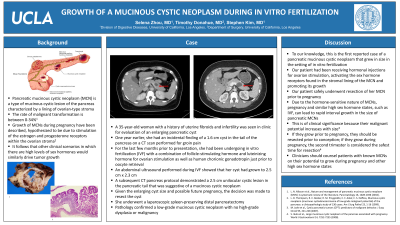Sunday Poster Session
Category: Biliary/Pancreas
P0099 - Growth of a Mucinous Cystic Neoplasm During in Vitro Fertilization
Sunday, October 22, 2023
3:30 PM - 7:00 PM PT
Location: Exhibit Hall

Has Audio
.jpg)
Selena Zhou, MD
UCLA
Los Angeles, CA
Presenting Author(s)
Selena Zhou, MD, Timothy Donahue, MD, Stephen Kim, MD
UCLA, Los Angeles, CA
Introduction: Pancreatic mucinous cystic neoplasm (MCN) is a type of mucinous cystic lesion of the pancreas characterized by a lining of ovarian-type stroma. The rate of malignant transformation is between 0-34%. Growth of MCNs during pregnancy has been described, hypothesized to be due to stimulation of the estrogen and progesterone receptors within the ovarian stroma. It follows that other clinical scenarios with high levels of sex hormones would similarly drive tumor growth. We present the first case of a MCN that grew in size while the patient was undergoing in vitro fertilization (IVF).
Case Description/Methods: A 35-year-old woman with a history of uterine fibroids and infertility was seen in clinic for evaluation of an enlarging pancreatic cyst. One year prior, she had an incidental finding of a 1.6 cm cyst in the tail of the pancreas on a CT scan performed for groin pain. Over the last few months, she had been undergoing IVF with a combination of follicle-stimulating hormone and luteinizing hormone for ovarian stimulation as well as human chorionic gonadotropin just prior to oocyte retrieval. An abdominal ultrasound performed during IVF showed that her cyst had grown to 2.5 cm x 2.3 cm. A subsequent CT pancreas protocol demonstrated a 2.5 cm unilocular cystic lesion in the pancreatic tail that was suggestive of a mucinous cystic neoplasm. Given the enlarging cyst size and possible future pregnancy, the decision was made to resect the cyst. She underwent a laparoscopic spleen-preserving distal pancreatectomy. Pathology confirmed a low-grade mucinous cystic neoplasm with no high-grade dysplasia or malignancy.
Discussion: Pancreatic mucinous cystic neoplasms (MCNs) are histologically defined by the presence of ovarian-type stroma. Their malignant potential increases with size, which makes their management during pregnancy difficult as MCNs have been reported to grow in response to the increased production of sex hormones during pregnancy. To our knowledge, this is the first reported case of a pancreatic MCN that grew in size in the setting of in vitro fertilization. Our patient had been receiving hormonal injections for ovarian stimulation, activating the sex hormone receptors found in the stromal lining of the MCN and promoting its growth. Our patient safely underwent resection of her MCN prior to pregnancy. Due to the hormone-sensitive nature of MCNs, pregnancy and similar high sex hormone states, such as IVF, can lead to rapid interval growth in size of pancreatic MCNs.

Disclosures:
Selena Zhou, MD, Timothy Donahue, MD, Stephen Kim, MD. P0099 - Growth of a Mucinous Cystic Neoplasm During in Vitro Fertilization, ACG 2023 Annual Scientific Meeting Abstracts. Vancouver, BC, Canada: American College of Gastroenterology.
UCLA, Los Angeles, CA
Introduction: Pancreatic mucinous cystic neoplasm (MCN) is a type of mucinous cystic lesion of the pancreas characterized by a lining of ovarian-type stroma. The rate of malignant transformation is between 0-34%. Growth of MCNs during pregnancy has been described, hypothesized to be due to stimulation of the estrogen and progesterone receptors within the ovarian stroma. It follows that other clinical scenarios with high levels of sex hormones would similarly drive tumor growth. We present the first case of a MCN that grew in size while the patient was undergoing in vitro fertilization (IVF).
Case Description/Methods: A 35-year-old woman with a history of uterine fibroids and infertility was seen in clinic for evaluation of an enlarging pancreatic cyst. One year prior, she had an incidental finding of a 1.6 cm cyst in the tail of the pancreas on a CT scan performed for groin pain. Over the last few months, she had been undergoing IVF with a combination of follicle-stimulating hormone and luteinizing hormone for ovarian stimulation as well as human chorionic gonadotropin just prior to oocyte retrieval. An abdominal ultrasound performed during IVF showed that her cyst had grown to 2.5 cm x 2.3 cm. A subsequent CT pancreas protocol demonstrated a 2.5 cm unilocular cystic lesion in the pancreatic tail that was suggestive of a mucinous cystic neoplasm. Given the enlarging cyst size and possible future pregnancy, the decision was made to resect the cyst. She underwent a laparoscopic spleen-preserving distal pancreatectomy. Pathology confirmed a low-grade mucinous cystic neoplasm with no high-grade dysplasia or malignancy.
Discussion: Pancreatic mucinous cystic neoplasms (MCNs) are histologically defined by the presence of ovarian-type stroma. Their malignant potential increases with size, which makes their management during pregnancy difficult as MCNs have been reported to grow in response to the increased production of sex hormones during pregnancy. To our knowledge, this is the first reported case of a pancreatic MCN that grew in size in the setting of in vitro fertilization. Our patient had been receiving hormonal injections for ovarian stimulation, activating the sex hormone receptors found in the stromal lining of the MCN and promoting its growth. Our patient safely underwent resection of her MCN prior to pregnancy. Due to the hormone-sensitive nature of MCNs, pregnancy and similar high sex hormone states, such as IVF, can lead to rapid interval growth in size of pancreatic MCNs.

Figure: Mucinous cystic neoplasm in the tail of the pancreas.
Disclosures:
Selena Zhou indicated no relevant financial relationships.
Timothy Donahue indicated no relevant financial relationships.
Stephen Kim: Boston Scientific – Consultant. Exact sciences – Consultant.
Selena Zhou, MD, Timothy Donahue, MD, Stephen Kim, MD. P0099 - Growth of a Mucinous Cystic Neoplasm During in Vitro Fertilization, ACG 2023 Annual Scientific Meeting Abstracts. Vancouver, BC, Canada: American College of Gastroenterology.
